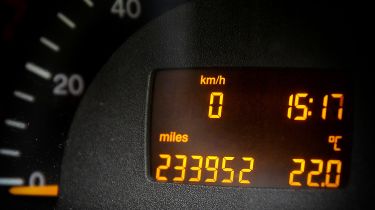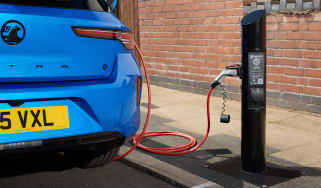Excess mileage charges on car finance deals: what are they and how do you avoid them?
Exceed the agreed mileage limit on car finance deals and you could end up paying an excess mileage charge…

We all know how many miles we drive in a year, right? Most of us have some idea, but there is a temptation to underestimate how far you’ll drive when financing a car on a lease or PCP deal to get a cheaper monthly payment. This can be a risky strategy that could see you paying more in the long run.
Some customers who take out PCP deals may choose a lower annual mileage allowance to reduce their monthly payments, on the basis that they’ll either pay the balloon payment and keep the car at the end, or trade it in for a new car before the deal finishes once they have built up some equity in the car.
That approach can work, but it isn’t short of risk. If the car’s value falls and you can’t settle the finance or trade in as planned, you may be forced to hand the car back to the finance company, and at that point, any extra miles you’ve covered could result in hefty charges.
As a general rule, you should always over-estimate your mileage on any agreement you take out to avoid any charges.
What is the excess mileage charge?
When you agree to a Personal Contract Hire (PCH) or Personal Contract Purchase (PCP) deal to fund a new car, one of the first things you’ll be asked for is how many miles per year you want to drive. Most finance deals offer anything between 6,000 miles and 30,000 miles per year. Multiply that by the number of years you want the deal to run and you’ll have the mileage total for the contract. If you go over that total, however, you will incur an excess mileage charge.
A PCP or lease deal’s monthly payment is worked out based on the difference between the value of the car at the start and end of the finance period.
If you exceed the number of agreed miles in the car, it’s likely the car will end up being worth less than the finance company expected at the end of the deal. The excess mileage charge covers the company against this and effectively makes you pay for the unexpected decrease in the car’s value.
How much an excess mileage charge is depends on the individual finance company and the car you’re leasing. The price per excess mile varies between 5p and 50p, so even a few thousand extra miles at the end of the lease deal can add up to a large additional bill for you.
The cost of excess mileage charges will be in the lease deal contract, but it can be buried in the small print, so check it carefully. If it’s not obvious, ask the finance company to confirm what it charges for excess mileage.
When do you need to pay excess mileage charges?
In most cases, excess mileage charges will only be applied when you hand back a car at the end of the finance deal if it has gone over the agreed total mileage of the contract.
If you’re on a PCP agreement and expect to go over your mileage allowance, you can either pay the final balloon payment to own the car outright, or trade the car in at a dealership. If your car is worth more than the settlement figure, the dealership will pay off your finance and give you the extra to go towards your next car, helping you avoid the excess mileage charges.
There are some drivers who won't worry about the total mileage they cover and just pay the fees, while others who are more cautious will stop using the car towards the end of the lease period to stay within the agreed mileage limit.
If you need to hand the car back early on a lease deal, or agree to terminate a PCP agreement early after you’ve paid off 50 per-cent of the total amount, you will unfortunately have nowhere to hide if you’ve gone over the allotted mile limit.
If you agreed to 10,000 miles per year over a three-year deal, but hand the car back at the two-year point with 24,000 miles showing, the finance company is almost certainly going to charge you for those 4,000 excess miles, plus any early termination fees.
How much is the excess mileage charge?
The amount a finance company charges for excess mileage varies, typically ranging from 5p to 50p per excess mile depending on which lender you use and takes into account the specific make and model of car.
If you signed up to an 8,000-mile per year deal over three years, that’s 24,000 miles in total. Hand the car back with 27,000 miles on the clock and you will be liable for 3,000 excess miles. Say the finance company charges 10p per excess mile, a 3,000-mile excess will cost you £300.
Some finance companies don’t include VAT in the quoted excess mileage charge, so you might have to pay a further 20% on top of the charge. This means the £300 example above could end up costing you £360 all in.
It’s worth bearing in mind that an excess mileage charge is not as bad as it can seem. If you agree to a higher annual mileage on a finance deal, your monthly payments will be higher. This is because you are effectively paying for the mileage you cover in advance, rather than being hit with a single charge at the end.
How do you avoid paying the excess mileage charges?
The simplest way to avoid any excess mileage charge is to stay within the agreed mileage limit of the finance deal. You need to be realistic about the mileage you need when agreeing a deal. If you aren’t 100 per-cent sure, we’d advise adding 10 per-cent extra to be safe. That’s not always possible, though, if you move house or circumstances change such as a new job with a longer commute.
These unexpected changes to your driving routine can quickly add up the miles, so the best thing is to speak to the finance company and ask to adjust the agreed mileage limit. Most providers will be willing to do this with an increase in your monthly payment to reflect the greater number of miles the car will have when it is returned at the end of the deal. Speak to the finance company as soon as possible and do not ignore the issue.
Never be tempted by one of the ‘mileage correction’ or ‘mileage adjustment’ firms that advertise their services. Altering the mileage of a car is illegal and called odometer fraud, better known as ‘clocking’. Paying any excess mileage is far cheaper than a court fine and possible jail term.
Frequently Asked Questions
Yes. When you take on a Personal Contract Hire lease, you are entering into a contract with the finance provider. The terms and conditions of the deal will be in the contract you sign, so make sure you read the small print.
Refusing to pay an excess mileage charge could result in you being taken to court, the case being handed to a debt recovery agency that adds further to the cost, or your credit rating being affected. You might also be refused another lease car deal in the future.
Looking for a great deal on a new car? These are the best new car deals...











